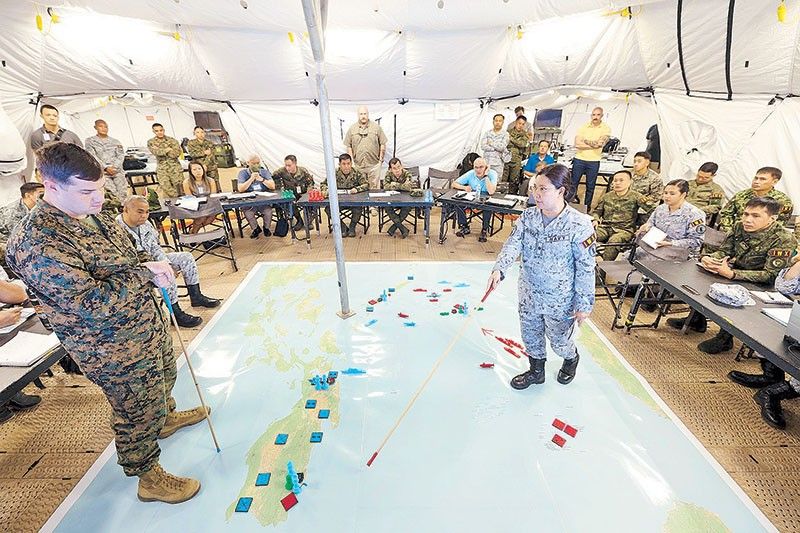14 countries observing expanded Balikatan

Philippines, US, Australia, France set joint drills
MANILA, Philippines — Representatives of 14 nations will arrive in the country as observers in the coming Balikatan exercises, the biggest multi-nation assembly so far, to witness the annual joint drills originally conducted only by Philippine and US troops.
Organizers said this year’s 39th iteration of the Balikatan – scheduled from April 22 to May 10 – will have observers from Brunei, Canada, France, Germany, India, Indonesia, Japan, Malaysia, New Zealand, Singapore, South Korea, Thailand, the United Kingdom and Vietnam.
Aside from the 16,000 members of the Armed Forces of the Philippines and the US military, contingents from the Australian Defense Force and – for the first time in Balikatan’s history – the French Navy will also participate in the maneuver, particularly in the joint sail.
For this year, a multilateral maritime activity or joint sail in the West Philippine Sea (WPS) will traverse the edge of the country’s exclusive economic zone (EEZ) and launch attacks on an “enemy” vessel in Philippine waters, according to Lt. Col. John Paul Salgado, chief of the Combined Joint Information Bureau.
He said this year’s Balikatan aims to bolster collaboration and readiness “across a spectrum of critical areas,” including external defense operations, cyber defense, counterterrorism, humanitarian assistance and disaster response and interagency capacity building.
“Our combined capabilities with the Armed Forces of the Philippines are stronger than ever. Every day that we work and train together, the bonds between our people grow stronger, our capabilities grow stronger, our alliance grows stronger,” said Lt. Gen. William Jurney, commander of US Marine Corps Forces Pacific and US exercise director for Balikatan 2024.
“This year, we’ve increased the scope, scale and complexity across all domains,” Jurney said. “We’re building military readiness across the full range of combined and joint operations. It’s our most expansive Balikatan yet.”
He added the exercise “directly supports the US-Philippine Mutual Defense Treaty by enhancing military cooperation and readiness between the two militaries.”
AFP Chief of Staff Gen. Romeo Brawner Jr. said this year’s Balikatan “underscores our steadfast dedication to amplify interoperability and readiness by collaborating with our friends, partners and ally.”
“Together, we speed up our march towards enhancing our military capabilities for maritime security alongside honing other competencies in order to effectively address the dynamic challenges across all domains,” he added.
The AFP has repeatedly clarified that Balikatan is not directed at any particular country, although it would now be focusing on external defense.
The country is involved in a maritime row with China, which had in many cases resorted to aggressive acts to assert its illegal claims in the West Philippine Sea.
Salgado said this year’s training events are structured around three main components – Command and Control Exercise (C2X), Field Training Exercise (FTX) and Humanitarian Civic Assistance (HCA) – to cover various locations under the Northern Luzon Command, Western Command and Southern Luzon Command areas of operation.
C2X events include a Staff Exercise, a Cyber Defense Exercise and an inaugural Information Warfighter Exercise, all designed to test the ability of AFP and US forces to plan, command and communicate effectively in simulated scenarios.
The FTX, on the other hand, will concentrate on combined joint all-domain operations, including vital maritime terrain protection, air assault operations and reconnaissance activities.
Additionally, Salgado said it would feature the deployment and utilization of cutting-edge military assets such as the High Mobility Artillery Rocket System (HIMARS) Rapid Infiltration, Integrated Air and Missile Defense (IAMD) and various unmanned aerial systems.
“The key event will be the Maritime Strike, which seeks to integrate joint and combined fires, combined joint dynamic targeting and multi-domain effects through the sinking of the adversary’s vessel,” he pointed out.
Salgado also said Balikatan 2024 will incorporate HCA projects aimed at benefiting local communities, like construction of school buildings in Ilocos Norte and Cagayan, as well as health care centers in La Union and Palawan.
“Furthermore, the AFP will host an international observers program to promote regional defense cooperation among ASEAN member-nations and other strategic partners. A Multilateral Maritime Exercise, featuring participation from the AFP, US and French navies, is also planned within the Philippines’ exclusive economic zone,” he said.
The AFP and the US civil-military operations task force have been conducting humanitarian civic assistance activities at five locations in the western and northern Philippines since late March, with projects expected to be completed by the end of Balikatan 2024.
“Balikatan is more than an exercise; it’s a tangible demonstration of our shared commitment to each other. It matters for regional peace, it matters for regional stability,” Jurney said. “When we increase our mutual response and defense capabilities, we strengthen our ability to promote regional security and protect our shared interests.” — Roel Pareno
- Latest
- Trending
































